EV battery
API
Haga clic, dé su consentimiento y recupere el SoC.
Lea el nivel y la capacidad de la batería de un vehículo eléctrico con simples solicitudes de API.

Nivel de batería
Consulta el estado de carga (SoC) y la autonomía restante de un vehículo eléctrico a batería (BEV) o de un vehículo híbrido enchufable (PHEV).
Capacidad de la batería
Conoce la capacidad de la batería de un vehículo eléctrico.
Características del producto
Compatible con 39 marcas de automóviles
Flujo de consentimiento de usuario amigable
Funciona en vehículos de 2015 y más recientes
Fiable y seguro
Acceso a datos de vehículos en tiempo real
SDK para Go, Java, Node.js, Python y Ruby
Industrias relacionadas
Redes de carga de vehículos eléctricos
Proporciona tiempos de carga estimados, horarios de carga automática y planificación de viajes con vehículos eléctricos en tu aplicación.
Proveedores de energía y servicios públicos
Gestione la carga de vehículos eléctricos residenciales de sus clientes para equilibrar mejor la carga de la red eléctrica.


.jpg)

